|
|
|
Sort Order |
|
|
|
Items / Page
|
|
|
|
|
|
|
| Srl | Item |
| 1 |
ID:
161590
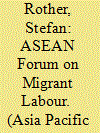

|
|
|
|
|
| Summary/Abstract |
The aim of this article is to discuss and substantiate new spaces for the political participation of migrant civil society at the regional level in Southeast Asia through the lens of the Association of Southeast Asian Nations (ASEAN) Forum on Migrant Labour (AFML). The AFML process is shaped by the International Labour Organisation and mirrors its tripartite format, essentially bringing together governments, employers’ and workers’ organisations. Crucially, migrant support and self‐organisations also have access, even if somewhat restricted, to regularly held deliberations. In light of the ASEAN consensus on migration that was agreed upon at the end of 2017, the article situates the AFML within the ongoing process of migration governance in the region and focusses especially on the role of migrant civil society as an important stakeholder. Based on the specific experience of civil society organisations (CSOs) from Malaysia, the article discusses which spaces the forum provides for civil society actors and how the latter use them for their advocacy. The major argument of the article is that the development of migration policies at the regional level can benefit from the inclusion of migrant civil society in the process. The governance of migrants could thus be complemented by governance for and by migrants.
|
|
|
|
|
|
|
|
|
|
|
|
|
|
|
|
| 2 |
ID:
161582
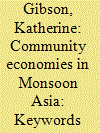

|
|
|
|
|
| Summary/Abstract |
A diversity of place‐based community economic practices that enact ethical interdependence has long enabled livelihoods in Monsoon Asia. Managed either democratically or coercively, these culturally inflected practices have survived the rise of a cash economy, albeit in modified form, sometimes being co‐opted to state projects. In the modern development imaginary, these practices have been positioned as ‘traditional’, ‘rural’ and largely superseded. But if we read against the grain of modernisation, a largely hidden geography of community economic practices emerges. This paper introduces the project of documenting keywords of place‐based community economies in Monsoon Asia. It extends Raymond William’s cultural analysis of keywords into a non‐western context and situates this discursive approach within a material semiotic framing. The paper has been collaboratively written with co‐researchers across Southeast Asia and represents an experimental mode of scholarship that aims to advance a post‐development agenda.
|
|
|
|
|
|
|
|
|
|
|
|
|
|
|
|
| 3 |
ID:
161583
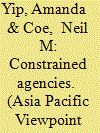

|
|
|
|
|
| Summary/Abstract |
This paper presents the first economic geography study of Singapore's temporary staffing industry. Drawing on secondary data and semi‐structured interviews with trade association representatives and senior executives from temporary staffing agencies, it examines the structure and characteristics of Singapore's industry and, more specifically, how its distinctive institutional configuration influences the activities of staffing agencies and the industry's overall trajectory. While temporary staffing in Singapore has experienced steady growth since the turn of the millennium, growth is ultimately constrained by both Singapore's regulatory environment and the inherent nature of its labour market. As such, the temporary staffing industry is still relatively small today, and has become increasingly saturated with strong competition between transnational and domestic agencies. Empirically, analysis of the Singapore case contributes to the wider literature on temporary staffing markets by profiling the nature and growth dynamics of a small and emerging temporary staffing market. Conceptually, the study reveals under‐studied aspects in current work relating to how the market is shaped by intersections with shifting global divisions of labour, the nature of the state's managed immigration regime and elements of national labour‐market culture.
|
|
|
|
|
|
|
|
|
|
|
|
|
|
|
|
| 4 |
ID:
161591


|
|
|
|
|
| Summary/Abstract |
In Australia, the transfer of asylum seekers to Nauru for ‘processing’ and the harm experienced by refugees in this context has been analysed from various perspectives, including criticisms that this is a form of torture. However, the harm experienced by refugees seeking asylum has not been considered through a southern disability theory (SDT) lens. Whilst SDT has been employed to examine various contexts, the framework has not explicitly been used to discuss the production of impairment in Nauru. Our application of this framework in this context highlights the Global North and Global South inequalities operating on the bodies of those refugees seeking asylum who are initially obstructed from entry into Australia. SDT also highlights some Global North framings that do not include the production of impairment in theorising disabling conditions. This obscures the power relations underpinning the policies generating harm to those in Nauru; however, SDT makes these power relations central, thus providing a better framework for appreciating what is occurring in Nauru and the ongoing refugee transition undertaken to ‘claim’ asylum in Australia.
|
|
|
|
|
|
|
|
|
|
|
|
|
|
|
|
| 5 |
ID:
161585
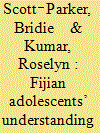

|
|
|
|
|
| Summary/Abstract |
Pacific Island countries are particularly vulnerable to future manifestations of climate change due to high coastline‐to‐land‐area ratios, and high dependence of inhabitants on natural ecosystems. While everyone in the Pacific Islands should participate in climate change adaptation activities, it is the young people, given they are the generation likely to not only bear the burden of climate change, but to lead and live effective climate change adaptation activities and strategies specific to their region, the involvement of youth is critical. Pacific Island youths are often marginalised within traditional decision‐making hierarchies, therefore they are typically excluded from participating in meaningful discussions at community and government levels. Discussions were held with 30 adolescents aged 14–18 years in Fiji to explore knowledge and experiences regarding climate change. Participants revealed their dismay at their inability to talk to family – who they consider are not doing enough – about what they consider as appropriate responses to climate change, recommending the help of an authoritative outsider who could speak to their community leaders and family. Discussions also revealed that Fijian youth could not distinguish between changes in the climate and normal weather events, attesting to the importance of climate‐change education and awareness‐raising efforts within the Pacific Islands more generally.
|
|
|
|
|
|
|
|
|
|
|
|
|
|
|
|
| 6 |
ID:
161592


|
|
|
|
|
| Summary/Abstract |
The notion of dark networks has recently received attention in the literature on policy network analysis. Dark networks are defined as illegal and covert, in contrast to bright networks which are legal and overt. In this article, we suggest a third category – grey networks – which are characterised by their use of secrecy and concealment despite their ostensibly legal status. These networks are subject to contradictory imperatives. They employ methods that cannot be openly acknowledged within the larger legal and social framework in which they function. In this article, we illustrate this concept through an interview‐based study of Australia's immigration detention network. This network enacts a deterrence policy which has been widely condemned as breaching Australia's obligations under international law. At the same time, it is required to maintain a façade of lawfulness and respect for human rights.
|
|
|
|
|
|
|
|
|
|
|
|
|
|
|
|
| 7 |
ID:
161589


|
|
|
|
|
| Summary/Abstract |
The growth of the international migration of health workers in recent decades has taken place in the context of the transnationalisation of healthcare provision as well as of governance and policy responses. This paper examines international policy responses to cross‐border health worker migration in the Asia Pacific region. These include multilateral (global and regional) and bilateral policy agreements, policy dialogue and programmes of action in relation to key issues of ethical recruitment, ‘circular’ migration and labour rights and key themes of health workforce planning and management. The paper brings original new analysis of international datasets and secondary data to bear on the pressing and important questions of what international policy initiatives and responses are at work in the Asia Pacific region, and what these mean for the nature of migration governance in the region. The paper's focus routes the evidence and argument towards current research and policy debates about the relationship between health worker migration, health worker shortages and poor health outcomes. In this, the paper brings new insights into the analysis of the international policy ‘universe’ through its emphasis on multiple and intersecting cross‐border institutions, initiatives and actors operating across different scales. Coherent national and international strategies for integrated health worker migration governance and policy need to incorporate these insights, and the paper considers their implications for current strategies to attain universal health care and improved health outcomes in Asia Pacific and beyond.
|
|
|
|
|
|
|
|
|
|
|
|
|
|
|
|
| 8 |
ID:
161586
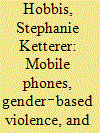

|
|
|
|
|
| Summary/Abstract |
This paper examines the potential benefits and pitfalls of mobile phones for accessing social services, particularly in response to gender‐based violence, in Solomon Islands and Papua New Guinea. Drawing on 13 months of ethnographic field research, I show how mobile phones increase rather than decrease perceived distances between social service providers and those they intend to serve. Mobile phones exaggerate the visibility of the shortcomings of the Solomon Islands and Papua New Guinea states and solidify an already entrenched distrust in the state and state services. This distrust is accentuated in experiences with mobile phone‐based mediations of gender‐based violence. Despite the positive influences of mobile phones, they are also recognised as conduits of violence. As such, mobile phones are not only morally ambivalent technologies but also, at times, actively disliked and their use discouraged. This challenges the optimism that surrounds many information and communication technologies for development (ICT4D) projects. When assessing the potentials, successes, and failures of ICT4D programmes, there is a need to pay more attention to the consequences of ‘negative’ or ‘unreliable’ usages of mobile phones as relational technologies.
|
|
|
|
|
|
|
|
|
|
|
|
|
|
|
|
| 9 |
ID:
161587
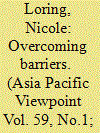

|
|
|
|
|
| Summary/Abstract |
Myanmar's 2015 elections have been credited with bringing about a myriad of changes within the country. Much has been written about the changing political climate within Myanmar. One topic which has not yet been discussed adequately, however, is the role of Burmese women in these recent elections. This paper seeks to examine women's political participation in Myanmar's recent move towards democratisation. Using rates of female candidacies in Burmese elections, comparing these figures with rates of female participation in other Southeast Asian countries, and ethnographic research with the Burmese voting public, this paper will contribute to the sparse scholarship regarding the role of women in new democracies and regime transitions. This paper finds that beliefs about traditional gender roles, rooted in traditional Buddhism, still shape the way both men and women in Myanmar view women's political participation. While women are better represented in Myanmar's government than they were in the past, this paper suggests that measures such as quotas or reserved seats based on gender may be the best way to increase Burmese women's political representation in the future.
|
|
|
|
|
|
|
|
|
|
|
|
|
|
|
|
| 10 |
ID:
161588


|
|
|
|
|
| Summary/Abstract |
Migration in one form or another has always been a part of human existence, but the politics that surround migration have shifted over time. The institutional actors involved in regulating the flow of migrants have increased in number and become more diverse. They are located not only within the state but also at sub‐ and supra‐state levels. There is also greater awareness of the various fields of policy that directly or indirectly interact with migration. Therefore, the issues engaging policymakers go well beyond controlling people's exit from one country and entry into another. They require bilateral and multilateral cooperation. Yet the world is still made up of single states continuing to assert their sovereignty over territorial borders and population movement, and the importance of migration governance in a transnational context is at an all‐time high. What processes shape the structure and the predominant patterns of migration between countries and what do these imply for the migration possibilities that confront different populations?
|
|
|
|
|
|
|
|
|
|
|
|
|
|
|
|
| 11 |
ID:
161584


|
|
|
|
|
| Summary/Abstract |
This paper demonstrates how disasters create sites of degradation – potent spaces of upheaval and engagement – that are readily filled and exploited by evangelical Christian groups. In doing so, it explores how disasters provide opportunities for evangelical groups to gain a foothold in localities where Christian presence, and evangelical praxis, may otherwise be restricted. Drawing on qualitative data collected in Sri Lanka throughout 2010–2011, two comparative case studies are presented that reveal the strategies of evangelical Christian praxis in and through sites of environmental and political degradation. Specifically, the case studies reveal how evangelical groups pursue ‘outside‐in’ and ‘inside‐out’ strategies of salvation, which, by blurring the boundaries of religion and relief, can lead to the formation of new hierarchies of power.
|
|
|
|
|
|
|
|
|
|
|
|
|
|
|
|
|
|
|
|
|